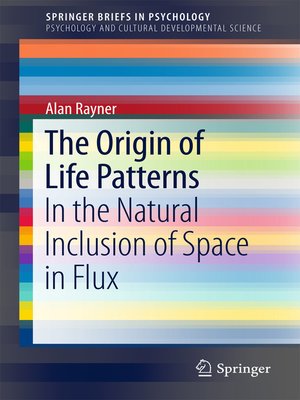The Origin of Life Patterns
ebook ∣ In the Natural Inclusion of Space in Flux · SpringerBriefs in Psychology
By Alan Rayner

Sign up to save your library
With an OverDrive account, you can save your favorite libraries for at-a-glance information about availability. Find out more about OverDrive accounts.
Find this title in Libby, the library reading app by OverDrive.



Search for a digital library with this title
Title found at these libraries:
| Library Name | Distance |
|---|---|
| Loading... |
Understanding the relationship between human cultural psychology and the evolutionary ecology of living systems is currently limited by abstract perceptions of space and boundaries as sources of definitive discontinuity. This Brief explores the new understandings possible when space and boundaries are perceived instead as sources of receptive continuity and dynamic distinction between local identities and phenomena. It aims to identify the recurrent patterns in which life is expressed over diverse scales in natural ecosystems and to explore how a new awareness of their evolutionary origin in the natural inclusion of space in flux can be related to human cultural psychology. It explains why these patterns cannot adequately be represented or understood in terms of conventional logic and language that definitively isolates the material content from the spatial context of natural systems.
Correspondingly, the Brief discusses how the perception of naturalspace as an infinite, intangible, receptive presence, and of natural informational boundaries as continuous energetic flux, revolutionizes our understanding of evolutionary processes. The mutual natural inclusion of receptive space and informative flux in all distinguishable local phenomena enables evolutionary diversification to be understood as a fluid dynamic exploration of renewing possibility, not an eliminative 'survival of the fittest'. Self-identity is recognized to be a dynamic inclusion of natural neighborhood, not a definitive exception from neighborhood.
The Origins of Life Patterns will be of interest to psychologists, philosophers, anthropologists, evolutionary biologists, ecologists, mathematicians, and physicists.
Correspondingly, the Brief discusses how the perception of naturalspace as an infinite, intangible, receptive presence, and of natural informational boundaries as continuous energetic flux, revolutionizes our understanding of evolutionary processes. The mutual natural inclusion of receptive space and informative flux in all distinguishable local phenomena enables evolutionary diversification to be understood as a fluid dynamic exploration of renewing possibility, not an eliminative 'survival of the fittest'. Self-identity is recognized to be a dynamic inclusion of natural neighborhood, not a definitive exception from neighborhood.
The Origins of Life Patterns will be of interest to psychologists, philosophers, anthropologists, evolutionary biologists, ecologists, mathematicians, and physicists.







